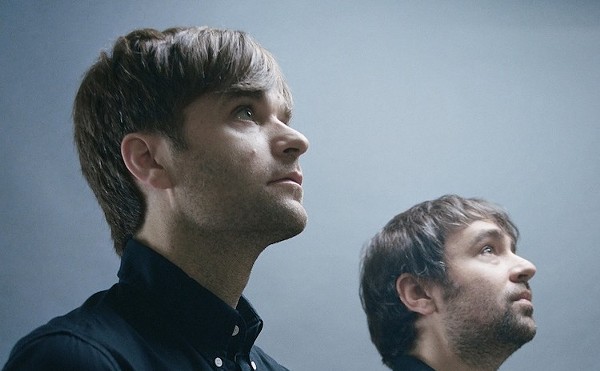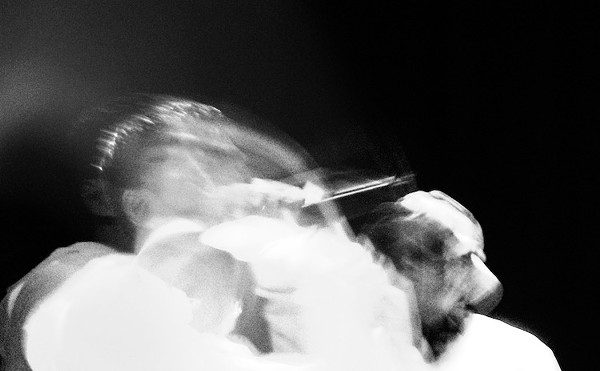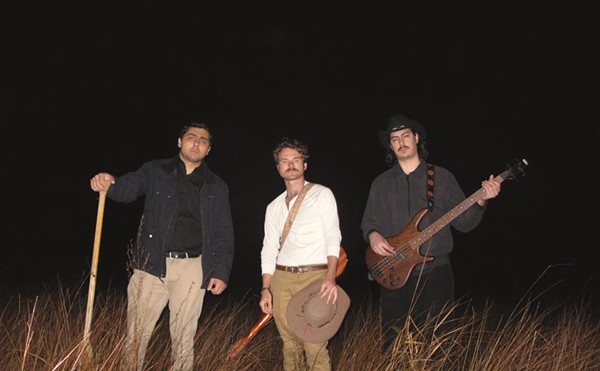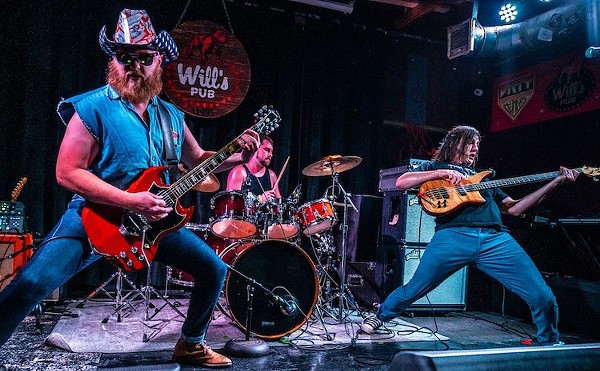Kirk McLeod and his four Seven Nations bandmates don't wear kilts onstage anymore, but they'd better have accouterments of a different sort at the ready -- coattails. And judging by the number of imitator bands that have sprung up in the last couple of years, those coattails will need to be extra-large.
It hasn't become a full-blown trend yet, but if it does, musicologists years hence will point to Seven Nations as the band at ground zero, the group that set the process in motion. If there is to be a bandwagon, Seven Nations will be leading the parade, and those jumping on will have to take their place behind them. They may well do for Celtic-rock fusion what the Squirrel Nut Zippers did for swing and hot jazz. They are the trailblazers, the pioneers, the ones who put it on the line, irrespective of trends or musical labels. They carved a niche for themselves that defies fads or gimmicks, that exists on its own merits and stands for exactly what it is.
And they're based in Orlando. But, ironically, Seven Nations does not play here often, making the performances Monday, Jan. 17, at the Central Florida Scottish-Highland Games and Thursday, Jan. 20, at Sapphire rare opportunities.
The question is, however, what exactly is the music of Seven Nations? And while the media-derived categorization of "Celtic rock fusion" does not offend McLeod, he prefers a slightly different description.
"Maybe some other Celtic enthusiasts get more offended than I would (about the term)," he says, "but if I had to call it something I would say that we're an ‘alternative rock band that has very strong Celtic influences.' We don't play much Celtic anymore, but you can definitely hear it in our songs."
Through and through. While straying from the traditional Scottish, Irish and Welsh aires, reels, hornpipes and ballads, it is evident that Seven Nations' collective heart is firmly rooted in the Old Country. Instrumen-tally, they would be indistinguishable from any number of traditional Celtic bands, but it is their original music, penned almost exclusively by McLeod, that sets them apart and gives them their identity.
And make no mistake about it, McLeod's choice of musical direction has nothing to do with hopping on a bandwagon, finding a gimmick or catching a wave and riding it. As proof, the 34-year-old has been playing the bagpipes since he was a 12-year-old Air Force brat.
"I started on keyboards when I was 8 and picked up guitar around the same time I started playing the pipes," he discloses. "I traveled around a lot with my dad, but I listened to the same things as everybody else growing up; that's where the whole fusion thing comes in. I was able to play in a lot of the Highland festivals around the country as a kid, but I'd always wanted to throw pipes in with rock music."
It wasn't until adulthood that he got his chance. He moved to New York and was working as a bartender by night and booking studio time by day to lay down original tracks.
"In fact," he smiles, "I was playing with pipers on weekends and playing rock with Struby (his bass player, then and now) during the week."
By '93 he was ready to test the musical waters of the Big Apple with his first incarnation. Calling themselves Clan na Gael and leaning more toward the traditional, they quickly found that an audience existed for their brand of music.
"My big realization wasn't so much, 'Oh my god, we'll make money doing this,' but that 'someone will come listen to us now,'" he remarks. "In New York City you might be playing with five other bands every night, and I was just happy that it fit because it gave us a chance to stand out among all the guitar bands."
By the following year they were ready for the studio, cutting their debut CD, "Rain & Thunder," as Seven Nations. In keeping with their ancestry (all members then and now are of Scottish or Irish descent), they chose the name to represent the seven ancient nations of the Celtic world: Alba (Scotland), Eire (Ireland), Cymru (Wales), Mannin (The Isle of Mann), Briezh (Brittany), Kernow (Cornwall) and Galacia (Spain).
Albums have followed at the rate of one per year and collective sales have impressively topped the 100,000 mark. Yet, it became apparent to McLeod early on that they were too far out of the mainstream of American top-40 radio gaga to rely on major-label support. So, in '96 they incorporated, forming their own record label out of their Windermere home base.
"It's hard to get over that hurdle," he says. "Back when I was shopping songs to high-powered attorneys in New York City to get one to represent me, George Stein (B-52s, Bryan Adams) really loved it. He actually did shop it to several companies and we did a showcase for Sony Records, but his first comment was, 'Kirk, I love it, but if I take it in to BMI they're going to say, what is this bagpipe stuff?'
"That's the battle you have to fight, but, you know, we've been trying to overcome hurdles differently anyway. Instead of just shopping it to record companies and let them do the work, we've been doing it ourselves."
The work is beginning to pay off -- on a number of levels. Less than a month ago they signed with a huge international booking agency, the Skylight Agency.
"We're probably the only unsigned band on their roster," reveals McLeod, who along with his 'mates has played over 260 shows per year for the past three years. "We are reaching people who hate bagpipes. If we can do that and get them to like our music and buy our records, I think we can go all the way with it at some point."
That "some point" may be very, very soon. Their current album, "The Factory," will clearly help them get to that point. It is their best effort to date, containing all the elements that bode well for career success. Lyrically, musically, vocally and emotionally it will be looked back upon as the benchmark for what Celtic rock is supposed to sound like. The fans are responding; to date it's the fastest selling disc in the band's catalog. Still, the band's top-selling CD is 1998's "Road Kill Vol. 1 & 2," at nearly 33,000 copies.
If '99 was a breakthrough year, 2000 could well be the year the secret gets out about Seven Nations. They kicked off the year with a bang, playing a New Year's Eve concert in Edinburgh, Scotland, in front of 40,000 fans. What's more, they were invited back by no less an august body than the National Trust of Scotland, the first American band to be accorded that honor. Ever.
They also have been getting some valuable television exposure on the Discovery Channel, CNN's WorldBeat, ESPN's Ultimate Heavy Athletic series, and PBS.
This also was the year that the band's personnel took an upturn. Though McLeod, bassist Struby and drummer Ashton Geoghagan have been the nucleus of the group for years, they've now added piper Scott Long and fiddler Dan Stacey, both of whom come with impeccable credentials. Long had been playing with Canada's hugely popular, triple-platinum-selling Ashley MacIsaac, while Stacey, from Stratford, Ontario, holds Canadian titles in both fiddle and stepdancing. Long, a Nova Scotia native, plays both Highland and Uillean pipes as well as mandolin. And McLeod, in addition to his lead vocal and songwriting chores, plays keyboards, guitar and Highland pipes.
"I think this is by far the best we've sounded," claims McLeod. "I'd never thought I'd be able to get a piper the caliber of Scott, especially since he was playing with someone as big as Ashley MacIsaac. And then to get Dan; having a violin just adds a whole new dimension to the sound that fits perfectly with what we are trying to do. I couldn't be happier."
Like anyone who pushes the envelope, who is on the vanguard, who's taking a traditional idiom and massaging it in unique and nontraditional ways, Seven Nations has had to parry its share of slings and arrows. Oddly enough, though, most of the backlash has come from this side of the Atlantic, not from the British Isles.
"It is interesting that we get it over here but not in Scotland," notes McLeod. "I guess some Americans are insecure enough with it that they get threatened. Our theory is that traditional music doesn't belong in a museum; it's got to be ever-changing; it's got to be alive. It doesn't upset me, because you can't make everybody happy and because there's always going to be people that like the traditional stuff and that's all they like. That's great, because we need people like that, too. I want the traditional music to survive as much as anybody and would never do anything to hurt it."
In fact, the case can be made that Seven Nations is actually furthering the cause of traditional Irish and Scottish music. McLeod reasons that "a lot of the people who like our stuff wouldn't even listen to bagpipes in the first place. ... and go on to discover some real Celtic music like the Chieftains, for example."
Then there is another criticism that McLeod and his mates have had to endure, the one about using their Scottish/Irish ancestry and their instrumentation in a rock setting as a gimmick to further their own "star trip." Clearly, these jabs are thrown by those who've never heard the band's virtuosity or been made aware of how serious they take their genealogy and heritage.
"The more popular you get, there are going to be people crying 'sellout' and 'gimmick,'" says McLeod with nary a trace of bitterness. "In fact, that's the reason we don't wear kilts onstage anymore, because that was already happening."
















